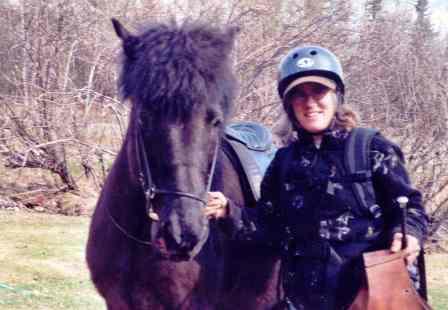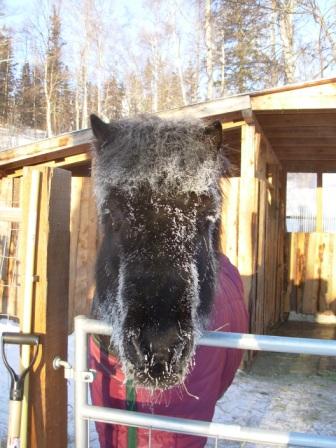
Home > About Us > Tinni > Inner Voice
Listening to my Inner Voice
In this January 3, 2009 essay, I allude to the fact that all horses, especially older ones, need ongoing care, especially in sub-zero temperatures.
It’s -25 as I write this. I’m sitting at the kitchen table, in the chair closest to the woodstove. Pete, upstairs, is watching a Clint Eastwood western. An oatmeal, apple, flax mash mixture is cooking on the stove. I’ve just finished tending to the horses, fed, cleaned up poop, and checked the water.
Raudi and Siggi’s noses were buried in hay. Tinni was standing by the gate, ignoring his share. We spent the better part of the day keeping tabs on him, making sure his poop was firm and monitoring his water and hay consumption.
Tinni is a stoic horse, so we keep a close eye on the external signs, which will clue us in if there is any duress. Before heading back to the house, I checked his pulse and respiration, and then rubbed his frosty face with my suit sleeve, so as to brush away some of the frost buildup. I mainly focused on his eyelids, and removed the frost dingle berries. He sighed, meaning that he appreciated the attention.
Today, the cold had a strange effect on me; it felt like my body and mind had been moving in slow motion. Because of this, I had to dig down deep in order to make the extra effort to assure that everything was okay here on the horse front. This wasn’t the first time.
Horses are walking contradictions. They are simultaneously strong and fragile. Icelandics are a northern cold-blooded horse, so they’re well-suited to Alaska’s harsh climate. But they share a commonality with other horses that live here, which is that they too can become ill, and sometimes for what seems to be no explicable reason.
All three horses have, at one time or another, have had mild cases of colic, a form of indigestion that varies in degree of severity. This required immediate attention, which took the form of taking long walks, monitoring their vital signs, watching to see that they kept from rolling. Twice, under our veterinarian’s directive, we gave Banamine. Two of the three incidents were late at night, the daytime one took place right before I was to leave for work.

I can deal with most horse-related problems when it’s cold. I have a Refrigerware suit, and it, along with multiple layers, gloves, over mitts, hats, and boots, keep me warm. I have a harder time dealing with such when I’m tired. I don’t know how veterinarians doing night-related multiple calls do this. It’s one thing to tend to your own animals, ones that you know and love, but quite another to tend to another’s animals. And too, such individuals have to deal with tired and distraught people.
Wait. I do know; because while I’ve been there, limitedly. An inner voice acts as a much-needed moral guide. It says “Put aside your petty concerns and take care of this problem. Now.” This voice is there, on the alert, and prepared to speak up if the situation merits it. At such times, I am pushed to care by the gentle winds of persistence. This voice also continues to guide my actions, and makes sure that the job gets done.
In general, inner voices differ. Some are bossy, some are cajoling. Some are audible, and some are inaudible. Mine is strident, and has no qualms about telling me in a very direct fashion what needs to be done in most horse and non-horse related situations. For instance, this is why my pen is so clean, and why the horses are fed in the winter six times a day.
No, it’s not me that’s obsessive compulsive; it’s my dang voice, urging me on. Here’s a better example. This evening, as I returned to the house, I deliberated some about giving Tinni an evening mash, figuring that he’d probably do just fine without it. However, the voice said “You said probably. The word probably signifies doubt. An ounce of prevention is worth a pound of cure.”
I went on the defensive, and told Voice that clichés didn’t work with this former English major. Voice immediately shut up. However, by the time I’d entered the cabin, I’d acknowledged that Voice had left me considering a “what if.” What if Tinni colicked and died? I would then always wonder if my having given him the mash would have prevented this from happening. It was far better, I thought, to make one more trip down to the pen.
Having this voice has better enabled me to care for Tinni, a fellow who is getting on in age. I often wish that I could send time backwards, and have him grow younger rather than older. However, this isn’t possible. And so, as he ages, he’s going to require even more on-the ground attention. Too, he’ll be ridden less, which to some, is the sole reason for having horses.
I was recently told by a local ranch owner that when their horses get old, they let them loose on the range, and there they die. For a time, I wondered if perhaps their inner voice dictated this, and then thought no. Inner voices err on the side of what’s right and just. That’s not right and just.
So, I reasoned, if there is an inner voice speaking here, it’s not being heard. Too bad, because this seems to me to be the actions of someone who is acting in a morally reprehensible fashion. One can say that this is letting nature take its course; however, we as humans can make animals comfortable in their old age, and if need be, put them out of their misery when the time comes.
Too often, many, when it comes to horses, supposed beasts of burden, lack a sense of indebtness. I owe T-man, Tinny, Tinsy, Tinman, whatever you want to call him, a good life in his old age because he’s given me his all. I’m now a far better rider than I used to be, and it’s because Tinni has been such a patient and willing teacher. When I first got him, three years ago, I was a timid, returning rider. The first time I took him out, we walked around our loop, and this was quite enough for me. A few weeks ago we cantered most of the way around the same route. His unerring ability to sense what I can and cannot do has taken us far.
Tinni isn’t a total steady eddy horse. He’s dumped me a few times, and he has had no qualms about heading for home when the opportunity presents itself. Once, in fact, I was five miles from home and had to walk all the way back to my place. What this, and a few other careless moments on my part has taught me is to relax when any horse bolts, and not to let go of their reins if I dismount when out on the road or trail.
My attention is diverted by the sound of the mash,
which is now bubbling. Pete is heading out to water and says that he’ll
take it out to Tinni. I gratefully accept his offer, and thank both him
and his inner voice.
Alys
Pete
Raudi
Siggi
Tinni
Older Horse
Inner Voice
Mistakes Made
Bootleg
Rainbow
Jenna
Goats
Chickens
